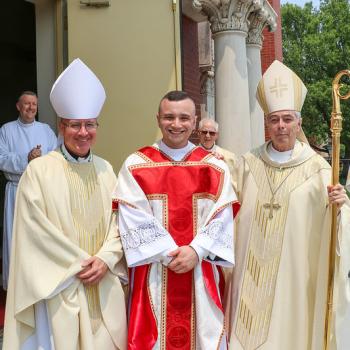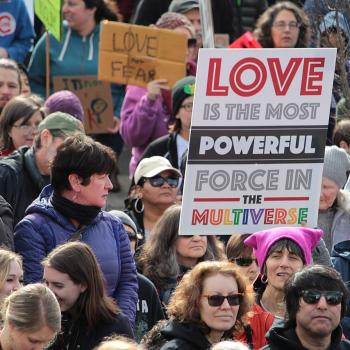Ask a Latter-day Saint what the fundamental principle of Mormonism is and you're likely to get a variety of answers. She might say "testimony." After all, we believe that the knowledge of God's truth is ultimately a matter of personal revelation, of which we can testify. Or she might say "the gift of the Holy Ghost," something that we believe we receive at confirmation, immediately after baptism. It is easy to imagine someone else saying "the belief in eternal families."
It might surprise most Mormons to discover that the founding prophet, Joseph Smith, said, "Friendship is the grand fundamental principle of Mormonism" (Andrew F. Ehat & Lyndon Cook, The Words of Joseph Smith, p. 234).
Of course the Prophet wasn't making a dogmatic theological pronouncement when he said that. He was reflecting in his diary, thinking about his friends. I don't want to make more of a private response to his situation at the time than the remark warrants. Nevertheless, I think what he wrote is important to understanding Mormonism, both in its beginnings and today. It says something about the Mormon ideal.
In Richard Bushman's biography of Joseph Smith, Rough Stone Rolling, Bushman repeatedly shows that Joseph's desire for friendship was central to much of what he did, even if sometimes his attempts to fulfill that desire failed. Joseph seems to have taken seriously John 15:14—"Ye are my friends"—understanding it to be the ultimate model for Christ's relationship with us and, therefore, for our relationships with one another: the kingdom of God will be a kingdom of God's friends rather than his servants.
We find one sign of Joseph's understanding in the revelation he received concerning "the school of the prophets," a school of both theological and secular learning for early church leaders. The most important requirement for those in the school was "clothe yourselves with the bond of charity as with a mantle, which is the bond of perfectness and peace" (D&C 88:125). That requirement was reflected in the ritual greeting by which the teacher was to welcome students as they entered the school. With hands upraised, the teacher was to say:
Art thou a brother or brethren? I salute you in the name of the Lord Jesus Christ, in token or remembrance of the everlasting covenant, in which covenant I receive you to fellowship, in a determination that is fixed, immovable, and unchangeable, to be your friend and brother through the grace of God in the bonds of love, to walk in all the commandments of God blameless, in thanksgiving, forever and ever. Amen. (D&C 88:133)
The school's greeting reflects a passage in the Book of Mormon that Latter-day Saints often refer to when they speak of the meaning of baptism. An early Book of Mormon prophet, Alma the elder, addresses a group of proselytes:
As ye are desirous to come into the fold of God, and to be called his people, and are willing to bear one another's burdens, that they may be light; yea, and are willing to mourn with those that mourn; yea, and comfort those that stand in need of comfort, and to stand as witnesses of God at all times and in all things, and in all places that ye may be in, even until death, that ye may be redeemed of God, and be numbered with those of the first resurrection, that ye may have eternal life—now I say unto you, if this be the desire of your hearts, what have you against being baptized in the name of the Lord, as a witness before him that ye have entered into a covenant with him, that ye will serve him and keep his commandments, that he may pour out his Spirit more abundantly upon you? (Mosiah 18:8-10)





